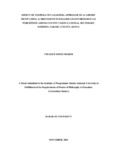EFFECT OF COOPERATIVE LEARNING APPROACH ON ACADEMIC MOTIVATION, ACHIEVEMENT IN ENGLISH AND ENVIRONMENTAL PERCEPTION AMONG COUNTY CO-EDUCATIONAL SECONDARY SCHOOLS, NAKURU COUNTY, KENYA
Abstract
A lot of scholarly research articles have lauded the positive significant contribution of
Cooperative Learning Approach (CLA) and its effect on student‟s academic
achievement. The objectives of the study were to: determine the effect of CLA on
student‟s academic motivation in English in Public Co-Educational County Secondary
schools in Nakuru County Kenya; examine its effect on Public Co-Educational County
Secondary schools student‟s perception of their classroom environment, and to establish
its effect on students‟ achievement in English in Public Co-Educational County
Secondary schools in Nakuru County Kenya. The study further sought to establish the
moderating effect of gender on the dependent variables. The study was guided by
cooperative learning integrative theories of motivation. The theoretical framework was
based on motivational theories and Slavin (2006) Research on Co-operative Learning.
The study adopted quasi experimental design, based on Solomon Four- group, Nonequivalent
Control Group Design. The target populations were students and teachers
from the four Public Co-Educational County Secondary schools of Nakuru County. The
accessible population was 766 form three students in the four schools. The study further
used simple random sampling in the selection of schools and purposive sampling to
select the form three class to participate in the study. A sample size of 242 from three
students and four teachers of English was used. The study involved two Experimental
groups, E
vii
1
and E
2
which were taught through CLA method and two Control groups, C
1
and C
2
which were taught through the Conventional methods. Three instruments were
used to collect quantitative data namely; English Achievement Test (EAT); Students‟
Motivation Questionnaire (SMQ), Student Perception Guide (SPG) of their classroom
environment while Teachers Perception Guide(TPG) and Student Interview Guide (SIG)
were used to collect qualitative data. Pilot testing of the instruments, EAT, SMQ, and
SPG was done in one Public Co-Educational County Secondary schools within Nakuru
County that had similar character traits as the sampled schools. Cronbach‟s alpha
coefficient was used to determine the reliability of EAT, SPG and SMQ. A reliability
coefficient of 0.812 for EAT, 0.801 for SPG and 0.789 for SMQ were obtained, hence
the instruments were acceptable. Data was analyzed using both descriptive and
inferential statistics using the Statistical Package for Social Sciences (SPSS version 24).
The differences between the group means was analyzed using t-test, ANOVA,
ANCOVA and statistical significance tested at alpha=0.05. The study found out that
there was statistically significant effect of cooperative learning approach on students‟
academic motivation in English in public co-education secondary schools in Nakuru,
County Kenya (F(1,126)=737.625, P<0.05). It was also found that there was statistically
significant effect of cooperative learning approach on students‟ achievement in English
in public co-educational county secondary schools in Nakuru, County Kenya
(F(1,216)=113043.974, p<0.05). The study further found that gender of the students had
a statistically significant moderating effect on the relationship between cooperative
learning approach and students‟ perception of classroom environment as well as
students‟ achievement of English in public co-educational secondary schools in Nakuru,
County Kenya. The findings of the study would be beneficial to teacher training colleges
and universities, in incorporate CLA in their pre-service teacher training as they shift and
prepare teachers to the new Competence Based Curriculum (CBC) and English teachers
to adopt CLA as an instructional strategy that would help improve the performance of
the subject.

